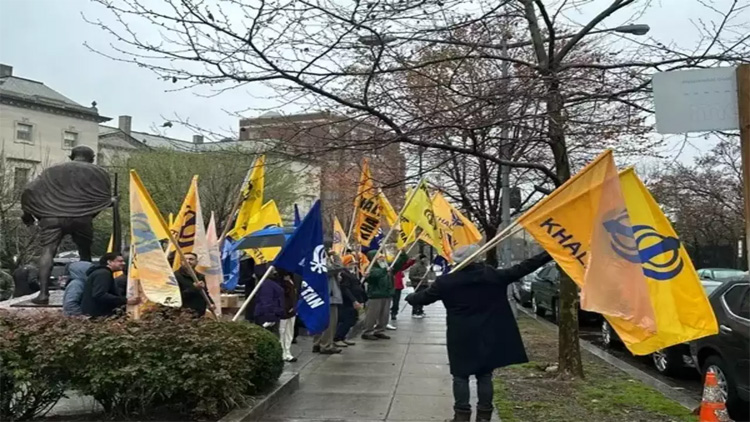US executive and legislative branch condemn Khalistani violence, assure protection
From the National Security Council (NSC) to the State Department to the Congress, the executive branch and members of legislative branch of the United States (US) government have strongly condemned the Khalistani extremist violence and vandalism against Indian diplomatic premises and threats to Indian diplomatic personnel.
The US State Department has also said that it is taking “coordinated action” to protect Indian diplomatic facilities and personnel, even as a set of influential legislators have strongly called on the authorities to do more in the wake of a second attack against the Indian consulate in San Francisco (SF) in less than three months.
In response to a question by HT about the US response to the attempted arson of SF consulate, repeated incidents of violence, status of action taken, and future steps to prevent violence, Donald Lu, assistant secretary of State for South and Central Asia, said that the US “strongly condemned” the “reported acts of vandalism and attempted arson” against the consulate in SF.
“Vandalism or violence against diplomatic facilities or foreign diplomats in the United States is a criminal offense. Consistent with our obligations under the Vienna Conventions, the Department is taking steps, including coordination with federal, state, and local law enforcement authorities, to protect the safety and security of the Indian Embassy and Consulates and the individuals who work within them,” Lu said in a written response on Thursday.
While State Department spokesperson Matthew Miller had called the incident a criminal offence earlier in the week, Lu’s reference to the Vienna Convention as well as a categorical commitment of coordinated action with security agencies at all levels to protect Indian facilities and personnel further builds on the condemnation.
Separately, in response to a similar question by HT, a spokesperson of the powerful NSC that operates from the White House said, “We take very seriously the safety and security of diplomats living in the United States and strongly condemn acts of vandalism or violence against diplomatic facilities or personnel.”
In the early hours of July 2, two violent extremists attempted to set fire to the Indian consulate in SF, with a video subsequently claiming this was an act to avenge the killing of a Khalistani leader, and a designated terrorist by India, Hardeep Singh Nijjar who was shot by unidentified gunmen in Canada in June. This was the second time that Khalistani extremists had attacked the consulate in less than three months. On July 8, Khalistani groups have also announced a march to the SF consulate, with the poster of the event openly threatening Indian ambassador to the US, Taranjit Singh Sandhu, and India’s consul general in SF, TV Nagendra Prasad, terming them “killers” of Nijjar.
The administration’s responses came on a day when there was a chorus of condemnation from the legislative branch in Washington DC.
The Congressional caucus on India and Indian-Americans, co-chaired by Republican Michael Waltz and Democrat Ro Khanna, issued a statement “strongly condemning” both the attempted arson and vandalism at the consulate and “the posters circulating on social media with violent rhetoric aimed at Indian diplomats, including Ambassador Sandhu”.
“We support the right to free speech and freedom of expression for every American, but that is not a license to vandalize property or incite violence. Violence against diplomatic facilities is a criminal offence and will not be tolerated. We urge the State Department to coordinate with law enforcement in their investigation of the damage at the Indian Consulate expeditiously and hold those involved accountable,” Waltz and Khanna said.
In a separate tweet, with an image of the poster, Khanna added that he knew Sandhu and respected him. “When I bring up human rights issues, he always engages with civility, thoughtfulness and candor. This rhetoric puts diplomats in harm’s way. It’s dangerous & has no place in a democracy. Free speech does not mean a license to incite violence.”
Other US Congressmen too condemned the Khalistani extremism.
Shri Thanedar, an Indian-American representative from Michigan, said that he condemned “in the strongest possible terms” the attacks at the SF consulate. “Violence and attempts to instil terror are unacceptable in democracy.”
Rich McCormick, a Congressman from Georgia, too said, “This attack on the Indian consulate in San Francisco is vile and unacceptable. Americans stand by our allies and our patriotic Indian-American community.”
Brian Fitzpatrick, a Congressman from Pennsylvania and a former Federal Bureau of Investigation special agent and federal prosecutor, while posting the link to a story on the State Department condemning the violence, tweeted “This kind of violence is lawless and unacceptable. I firmly condemn the repeated hateful attacks on the Indian Consulate and look forward to those involved being held accountable with appropriate legal action.”
Terming the attack on the SF consulate “greatly disturbing and unacceptable”, Mike Lawler, a Congressman from New York, said that as the second such incident in recent months, it was a cause of great concern. He condemned the vandalism and “any attempt or threat of violence against foreign diplomats and diplomatic facilities in this country”. He also recalled Prime Minister Narendra Modi’s visit to Washington and said he looked forward to a “continued, strong partnership with the world’s largest democracy”.
Unlike in the case of Canada, where political leadership is seen as either complicit or sympathetic or indifferent to Khalistani extremism and actions, in the US, the political and national security leadership has responded to incidents of violence with swift condemnation and engaged closely with Indian officials.
India, however, hopes that the condemnation and responsiveness of American authorities will translate into action and arrests of perpetrators of the violence, vigilant security for diplomatic facilities and personnel, preemptive steps to ensure that events such as the July 8 march don’t translate into violence given the past pattern of criminal behaviour, and a crackdown on Khalistani extremists who have used the US Constitution’s First Amendment’s provision of free speech to incite violence.

